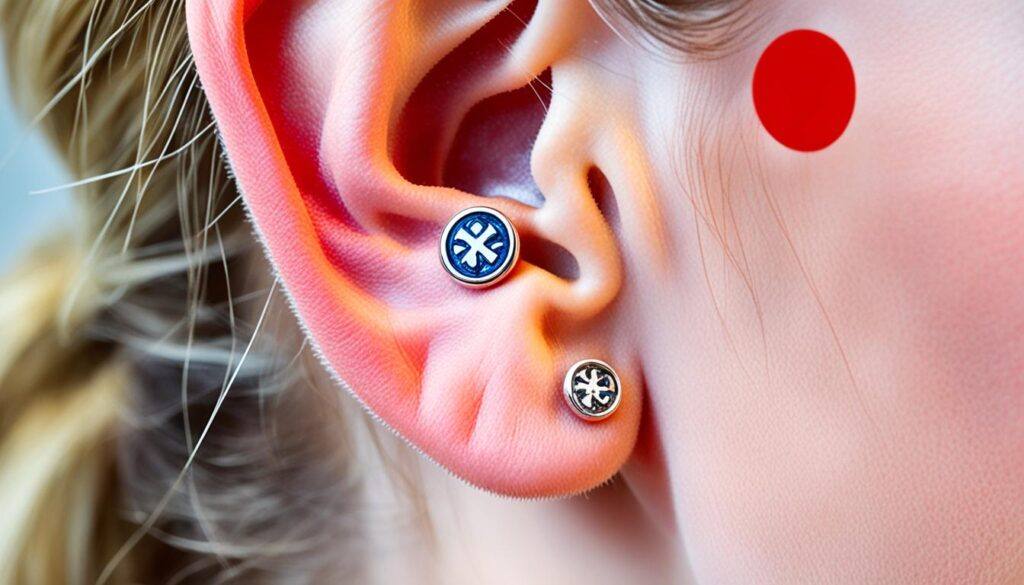Did you know that approximately 15% of the population has a nickel allergy? Nickel is a common allergen found in various metals, including stainless steel. While surgical stainless steel is often touted as a hypoallergenic option for jewelry, it may still cause allergic reactions in individuals with nickel allergies or sensitive skin. Understanding the properties and limitations of surgical stainless steel can help you make an informed decision when choosing hypoallergenic jewelry materials.
Key Takeaways:
- Surgical stainless steel may not be hypoallergenic for everyone, especially those with nickel allergies.
- Nickel is the most common allergen in stainless steel and can cause skin allergies.
- Individuals with sensitive skin should consider hypoallergenic alternatives to stainless steel jewelry.
- Hypoallergenic materials like medical-grade plastic and titanium are safe options for earrings.
- Other hypoallergenic metal options include niobium, sterling silver, and fine silver.
Understanding Stainless Steel Allergy
Nickel allergies are common, with an estimated 11 million children suffering from nickel-allergic contact dermatitis. Stainless steel, including surgical stainless steel, often contains nickel, which can cause allergic reactions in sensitive individuals. Symptoms of a nickel allergy include redness, itching, blisters, and irritation where the metal comes into contact with the skin. It is important to be aware of the nickel content in stainless steel jewelry and consider other hypoallergenic options.
Stainless steel is an alloy composed of iron, chromium, and potentially other metals like nickel and molybdenum. Nickel, in particular, is the most common allergen found in stainless steel and can trigger allergic contact dermatitis.
The presence of nickel in stainless steel can vary, depending on the specific grade and composition. While there are stainless steel alloys with lower nickel content, they may not be completely nickel-free. It is essential for individuals with nickel allergies or sensitive skin to understand the nickel content of the stainless steel they come into contact with.
If you experience symptoms of a nickel allergy when wearing stainless steel jewelry, it is advisable to consult a dermatologist for proper diagnosis and advice. They can perform patch tests to determine if you have a nickel allergy and recommend suitable hypoallergenic alternatives.
Nickel Allergy Symptoms
Nickel allergy symptoms typically occur in the area where the skin is in direct contact with nickel-containing materials, such as stainless steel jewelry. Common symptoms include:
- Redness
- Itching
- Blisters
- Irritation
- Rash
If you experience these symptoms after wearing stainless steel jewelry, it is likely that you have a nickel allergy. It is important to avoid further exposure to nickel to prevent allergic reactions and discomfort.
Testing for Nickel Allergy
To determine if you have a nickel allergy, a dermatologist can perform patch testing. Patch testing involves applying small amounts of allergens, including nickel, to your skin and observing any allergic reactions that develop over a period of time. This test can help identify specific allergens that may be causing your symptoms and guide you in choosing suitable hypoallergenic alternatives.
Hypoallergenic Alternatives
If you have a nickel allergy or sensitive skin, there are several hypoallergenic alternatives to stainless steel jewelry that you can consider:
- Medical-grade plastic: Jewelry made from medical-grade plastic is non-reactive and does not contain allergenic metals like nickel.
- Medical-grade titanium: Titanium is another hypoallergenic material often used in medical implants. It is non-reactive and suitable for individuals with sensitive skin.
- Niobium: Niobium is a highly corrosion-resistant and hypoallergenic metal that does not contain nickel or other additives.
- Sterling silver: Sterling silver, when pure, does not contain nickel and is a safe option for individuals with nickel allergies.
- Fine silver: Fine silver, which has a higher silver content than sterling silver, is also a hypoallergenic choice for jewelry.
By opting for hypoallergenic alternatives, you can continue to enjoy wearing jewelry without experiencing allergic reactions or skin irritations.
It is important to prioritize your skin’s safety and choose materials that are non-reactive and free from allergenic metals. Consider consulting a dermatologist or jewelry specialist for further guidance on choosing hypoallergenic jewelry.
The Need for Hypoallergenic Earrings
When it comes to earrings, individuals with sensitive skin or nickel allergies face unique challenges. The last thing they want is to deal with redness, itching, or irritation caused by allergenic metals like nickel found in regular jewelry. That’s why hypoallergenic earrings are the perfect solution for those seeking stylish accessories without the discomfort.
While some may assume that stainless steel jewelry is automatically hypoallergenic, it’s important to note that it doesn’t guarantee that the earrings are nickel-free. Stainless steel can still contain traces of nickel, causing allergic reactions in sensitive individuals. To ensure the safety of sensitive skin, it’s crucial to opt for earrings made from materials that are completely safe and free from allergenic metals.
Two popular materials used for crafting hypoallergenic earrings are medical-grade plastic and medical-grade titanium. These materials are specifically chosen for their non-reactive properties, making them ideal for individuals with sensitive skin or nickel allergies. Not only do they eliminate the risk of allergic reactions, but they also offer durability and style that rival traditional earrings.
Medical-grade plastic is an excellent choice for hypoallergenic earrings. This material is non-reactive and completely free from allergenic metals like nickel, ensuring a comfortable and itch-free wearing experience. Additionally, medical-grade plastic comes in a variety of colors and designs, making it easy to find a pair that suits your personal style.
Another option is medical-grade titanium, which is known for its biocompatibility and corrosion resistance. Titanium earrings are not only hypoallergenic but also lightweight, durable, and available in a range of designs. Whether you prefer studs, hoops, or dangles, there are hypoallergenic titanium earrings to match every taste.
When it comes to sensitive skin jewelry, it’s important to prioritize comfort and safety. By choosing hypoallergenic earrings made from materials like medical-grade plastic and medical-grade titanium, individuals can confidently showcase their style without the worry of allergic reactions and discomfort.
Related Products
| Product | Description | Material | Price |
|---|---|---|---|
| Stud Earrings | Medical-grade Plastic | $19.99 | |
| Hoop Earrings | Medical-grade Titanium | $29.99 | |
| Dangle Earrings | Medical-grade Plastic | $24.99 |
Safe Materials for Hypoallergenic Earrings
When it comes to choosing earrings for sensitive individuals, safety and hypoallergenic qualities are of utmost importance. To ensure comfort and minimize the risk of allergic reactions, it is crucial to select materials that are non-reactive and nickel-free. Let’s explore some safe options for hypoallergenic earrings.
Medical-Grade Plastic
One excellent choice for hypoallergenic earrings is medical-grade plastic. This material is non-reactive and does not cause allergic reactions. Medical-grade plastic is commonly used in medical implants, making it a reliable option for individuals with sensitive skin. Not only is it hypoallergenic, but it is also lightweight and comfortable to wear.
Medical-Grade Titanium
Another reliable choice for hypoallergenic earrings is medical-grade titanium. Like medical-grade plastic, titanium is non-reactive and does not contain allergenic metals like nickel. It is a popular material for medical implants due to its biocompatibility. Hypoallergenic earrings made from medical-grade titanium offer both durability and comfort.
Niobium
For those seeking alternative options, niobium is an excellent choice. It is highly resistant to corrosion and does not contain nickel or other additives that can trigger allergies. Niobium earrings are not only hypoallergenic but also stylish and versatile. They come in an array of designs, making it easy to find the perfect pair for any occasion.
Sterling Silver
For individuals who prefer the classic elegance of silver, sterling silver is a safe choice for hypoallergenic earrings. Genuine sterling silver jewelry is made from 92.5% pure silver, mixed with other metals for strength and durability. It is crucial to ensure that the sterling silver earrings are free from nickel, as some jewelry may have trace amounts of this allergenic metal.
Platinum
Most platinum pieces are safe for individuals with sensitive skin due to their hypoallergenic properties. Platinum is a dense and durable metal that is naturally white, making it an attractive choice for earrings. Its purity, generally 95% to 99%, ensures minimal risk of allergic reactions. However, it is essential to note that platinum alloys should be avoided, as they may contain traces of nickel.
While these materials provide safe options for hypoallergenic earrings, it is important to be cautious with certain metals. White gold, for example, often contains nickel and can cause allergic reactions. If opting for gold earrings, choosing a high karat grade gold, such as 18k or 24k, can minimize the risk of allergic responses.
Hypoallergenic Earring Materials
| Material | Hypoallergenic Features |
|---|---|
| Medical-Grade Plastic | Non-reactive, nickel-free, lightweight |
| Medical-Grade Titanium | Non-reactive, nickel-free, biocompatible |
| Niobium | Highly resistant to corrosion, nickel-free |
| Sterling Silver | 92.5% pure silver, hypoallergenic when nickel-free |
| Platinum | Naturally white, hypoallergenic when alloy-free |
When selecting hypoallergenic earrings, prioritizing materials that are non-reactive and nickel-free is essential. Consider the options mentioned above and choose earrings that not only suit your style but also keep your sensitive skin free from allergic reactions.
The Importance of Hypoallergenic Jewelry
Hypoallergenic jewelry is of utmost importance for individuals with skin sensitivity and the need to avoid allergic reactions. For those with nickel allergies, wearing hypoallergenic jewelry is crucial to prevent symptoms such as redness, itching, and irritation. By choosing earrings and other accessories made from hypoallergenic materials like medical-grade plastic and titanium, individuals can ensure a comfortable wear without experiencing any allergic reactions.
“I had been struggling with skin allergies whenever I wore jewelry until I discovered the importance of hypoallergenic options. Now, I can confidently wear earrings made from hypoallergenic materials without any discomfort or irritation.” – Emma, a satisfied customer.
Skin sensitivity varies from person to person, and some individuals are more prone to allergic reactions than others. That’s why it becomes essential to invest in nickel-free accessories that are specifically designed for sensitive skin. Hypoallergenic jewelry not only offers a solution for those who are already dealing with skin sensitivity but also serves as a preventive measure for others.
Key Benefits of Hypoallergenic Jewelry:
- Eliminates the risk of skin allergies and allergic reactions
- Provides a comfortable wearing experience without redness, itching, or irritation
- Suitable for individuals with nickel allergies or sensitive skin
- Available in various designs and styles, ensuring a wide range of options
Investing in hypoallergenic jewelry not only promotes skin health but also allows individuals to express their personal style without compromising on comfort. By opting for nickel-free accessories, individuals can confidently wear jewelry without the fear of allergic reactions or skin irritation.

| Hypoallergenic Jewelry | Benefits |
|---|---|
| Medical-grade Plastic | – Non-reactive material |
| Medical-grade Titanium | – Nickel-free and non-irritating |
| Niobium | – Highly resistant to corrosion – Does not contain nickel or other additives |
| Sterling Silver | – Safe for sensitive skin – Reputable vendors ensure nickel-free quality |
Exploring Stainless Steel Options
When it comes to jewelry, stainless steel alloys are a popular choice due to their durability, versatility, and affordability. Surgical stainless steel, in particular, is commonly used for various applications, including medical implants and jewelry. However, it’s essential to understand the properties of stainless steel and its potential allergenic properties, particularly its nickel content.
Stainless steel alloys comprise different grades that determine their specific characteristics and composition. Some of the most commonly used stainless steel grades in jewelry include austenitic SAE 316, martensitic SAE 440, SAE 420, and SAE 17-4. These grades offer varying levels of corrosion resistance, strength, and polishability, making them well-suited for different jewelry designs.
While stainless steel is generally considered safe for biomedical implants, it’s crucial to note its nickel content. Nickel is a common allergen that can trigger allergic reactions in individuals with nickel allergies. Despite its benefits, stainless steel still contains nickel, which may cause complications for those sensitive to this metal.
To ensure skin safety and minimize the risk of allergic reactions, it’s important to consider alternative materials and hypoallergenic options instead of relying solely on stainless steel. By exploring other materials, you can find suitable alternatives that are non-reactive and nickel-free, making them ideal choices for individuals with nickel allergies or sensitive skin.
| Stainless Steel Grade | Properties | Nickel Content |
|---|---|---|
| Austenitic SAE 316 | Excellent corrosion resistance and polishability | 8-10.5% |
| Martensitic SAE 440 | High strength and moderate corrosion resistance | 0.6-1.2% |
| SAE 420 | Good corrosion resistance and hardness | 0.15-0.4% |
| SAE 17-4 | High strength and improved corrosion resistance | 3-5% |
It’s important to note that these stainless steel grades are not inherently hypoallergenic due to their nickel content. For individuals with nickel allergies, it is recommended to explore alternative materials that offer hypoallergenic properties.
By considering hypoallergenic materials like medical-grade plastic, medical-grade titanium, niobium, sterling silver, and fine silver, you can find safe and non-irritating options for your jewelry needs. These materials are known for their non-reactive properties and are free from allergenic metals like nickel.
When it comes to selecting jewelry, prioritizing skin safety and avoiding allergic reactions is paramount. By diversifying your options and exploring hypoallergenic materials, you can enjoy stylish and comfortable jewelry without sacrificing your well-being.
Other Hypoallergenic Metal Options
In addition to medical-grade plastic and medical-grade titanium, there are several other hypoallergenic metal choices available for jewelry. These alternative materials provide a safe and stylish option for individuals with sensitive skin or nickel allergies. Let’s explore some of the popular choices:
Niobium
Niobium is highly resistant to corrosion and does not contain nickel or other additives, making it an excellent choice for sensitive individuals. It is known for its durability and versatility, allowing for unique designs that cater to personal style preferences.
Sterling Silver and Fine Silver
Sterling silver and fine silver are traditional metals that have been used in jewelry for centuries. Both options are generally safe for hypoallergenic jewelry, but it is crucial to ensure that they are from reputable vendors and free of nickel. These metals provide an elegant and timeless look for those seeking hypoallergenic alternatives.
Avoiding Alloys with Nickel
When choosing hypoallergenic jewelry, it is essential to steer clear of alloys that contain nickel, such as white gold. While white gold is a popular choice, it often contains nickel, which can cause allergic reactions for individuals with nickel allergies. Instead, opt for high karat grade gold or alternatives like niobium, sterling silver, or fine silver.
Comparison Table: Hypoallergenic Metal Options
| Material | Nickel Content | Allergenic Properties |
|---|---|---|
| Niobium | None | Non-reactive, highly resistant to corrosion |
| Sterling Silver | Low (if from a reputable vendor) | Non-reactive, classic and elegant |
| Fine Silver | None | Non-reactive, tarnish-resistant |
Remember, when choosing hypoallergenic jewelry, it’s essential to prioritize not only the aesthetics but also the safety and comfort of your skin. Exploring alternative materials like niobium, sterling silver, and fine silver provides you with a range of stylish options that are free from allergens and suitable for sensitive skin.
Conclusion
While stainless steel may be a durable and affordable option for jewelry, it may not be hypoallergenic for everyone. Individuals with nickel allergies or sensitive skin should consider hypoallergenic alternatives to ensure skin safety and avoid allergic reactions.
Medical-grade plastic and medical-grade titanium are excellent choices for hypoallergenic jewelry, as they are non-reactive and do not contain nickel. Another safe option is niobium, which is highly resistant to corrosion and does not contain any allergenic metals. Sterling silver and fine silver are also suitable choices, but it is important to ensure they are nickel-free and from reputable vendors.
Prioritizing skin safety is essential when it comes to choosing jewelry. By selecting materials that are non-reactive and nickel-free, individuals can confidently wear their favorite accessories without experiencing any allergic reactions. Whether it’s a pair of earrings or a necklace, opting for hypoallergenic alternatives such as medical-grade plastic, medical-grade titanium, niobium, sterling silver, or fine silver is the key to comfortable and worry-free accessorizing.
FAQ
Is surgical stainless steel hypoallergenic?
Surgical stainless steel may not be hypoallergenic for everyone, especially those with nickel allergies. While it is a durable and affordable metal for jewelry, it can still contain nickel, which can cause allergic reactions in sensitive individuals.
What are the symptoms of a nickel allergy?
Symptoms of a nickel allergy include redness, itching, blisters, and irritation where the metal comes into contact with the skin.
What are hypoallergenic earrings?
Hypoallergenic earrings are earrings made from materials that are safe for sensitive individuals and do not contain allergenic metals like nickel. Common hypoallergenic materials include medical-grade plastic and medical-grade titanium.
What materials are safe for hypoallergenic earrings?
Safe materials for hypoallergenic earrings include medical-grade plastic, medical-grade titanium, niobium, sterling silver, fine silver, and high karat grade gold. It is important to choose materials that are non-reactive and nickel-free to avoid allergic reactions.
Why is hypoallergenic jewelry important?
Hypoallergenic jewelry is important for preventing allergic reactions and skin sensitivity in individuals with nickel allergies. Wearing hypoallergenic jewelry allows individuals to enjoy wearing accessories without experiencing symptoms like redness, itching, and irritation.
What are the different stainless steel grades used in jewelry?
The most common stainless steel grades used in jewelry are austenitic SAE 316, martensitic SAE 440, SAE 420, and SAE 17-4. While these grades are considered safe for biomedical implants, they still contain nickel, which can cause complications for those with nickel allergies.
What are some other hypoallergenic metal options?
In addition to medical-grade plastic and medical-grade titanium, other hypoallergenic metal options include niobium, sterling silver, and fine silver. These materials are non-reactive and do not contain nickel or other allergenic additives.



